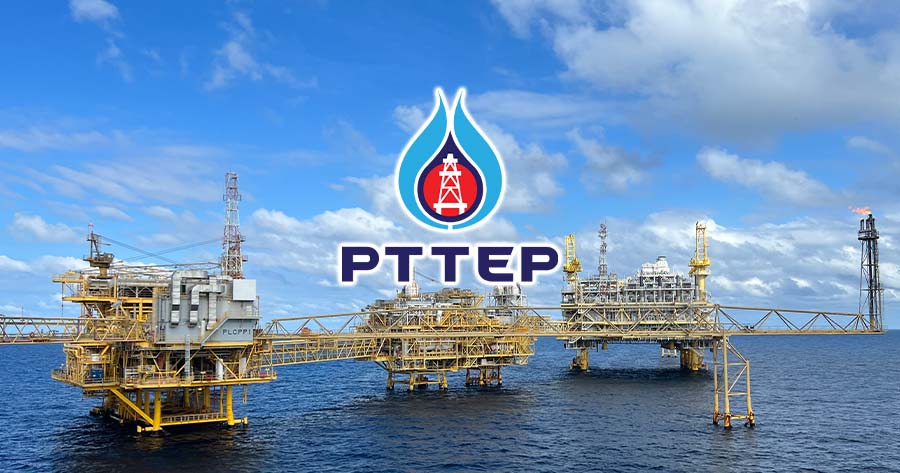Montri Rawanchaikul, CEO of PTT Exploration and Production Public Company Limited (SET: PTTEP), revealed to “Kaohoon” that currently the company’s production capacity in the Gulf of Thailand is still going according to the plan, with G1/61 (Erawan) field still producing 800 million sq.ft., daily as stated in the contract, G2/61 (Bongkoch) field still producing 700 million sq.ft., daily as said in contract, while the solar farm production exceeding the contract obligation of 280 million sq.ft., daily to 390 million sq.ft., daily. Meanwhile PTTEP is under negotiation for increasing sales of electricity from the solar plant to 340 million sq.ft daily.
PTTEP is drilling an additional gas well in its Yadana field in Myanmar, after Chevron withdrew in 2024 making PTTEP hold 62.96% shares of the Yanada natural gas deposit. Presently, Yanada is transmitting around 400 million sq.ft. to Thailand daily, and could be expanded to 200 million sq.ft. daily in around 2-3 years for this expansion.
Zawtika field also transmits natural gas to Thailand, making Myanmar account for 17% of natural gas distribution to Thailand. Despite the current transmission dropping to 14 %, the ratio could come back to 17% after the expansion of Yadana Well, alleviating gas price from Gulf of Thailand, and reducing importation of expensive LNG. In the earlier week, LNG prices shot up after Ukraine suspended Russian gas exports into Europe.
Currently, the Malaysia-Thai Joint Development Area project (MTJDA), which PETRONAS Carigali (JDA) Limited (PC JDA), a subsidiary of PETRONAS Carigali Sdn Bhd., has extended its contract with both countries for 10 additional years, pushing contract expiration date from 2029 to 2039.
The MTJDA is a natural gas and crude oil project located in the southern Gulf of Thailand in the Thai-Malaysia joint development area. It includes the B-17, C-19, B-17-01, and B-17-02 wells, covering an area of around 2,868 sq.km., operating under Carigali-PTTEPI Operating Company Sdn Bhd (CPOC), which PTTEP International Ltd., a subsidiary of PTTEP and PC JDA, both hold 50% shares, respectively.
Furthermore, PTTEP is pushing for exploration and production into the Andaman Sea, as it has previously received a permit from the petroleum committee in 2024. PTTEP is interested in the Andaman Sea for its potential, but has not conducted any exploration before due to the depth of 1,600 m, the company had expected the area to be a large natural gas reservoir. PTTEP is expecting an announcement from the Department of Mineral Fuels after the 25th charters, in which the Andaman Sea will be open for exploration and production later this year, the company has estimated exploration and production to take 5-6 years, faster than the initial estimation of 9 years.
PTTEP’s plan for 2025 would maintain its focus on the expansion of energy sector, especially in the Gulf of Thailand, Myanmar, JDA, and the Middle East. The company has planned to expand petroleum production in its current projects to support Thailand’s energy stability, which included the G1/61 project, the G2/61 project, the S1 solar project, the contract 4 project, the MTJDA project, and Zawtika-Yadana project in Myanmar, which imported natural gas into Thailand. Additionally, the plan also includes PTTEP’s main projects in foreign countries such as Malaysia and Oman.
In 2025, PTTEP has estimated petroleum sales to be on average 507,000 barrels of oil equivalent daily and has allocated its five-year (2025-2029) budget to $33,587 million. PTTEP also supports sustainable governance by establishing new businesses to support transformation in energy, as such the company also allocates an additional five-year (2025-2029) budget of $1,747 million to support investment in off-shore wind farm and carbon capture and storage as a service, hydrogen fuel business, and invest in business and technology from subsidiaries that operate as corporate venture capital, while also preparing the company for energy transition into low a low carbon organization in the future. PTTEP also takes care of the local community surrounding the company’s operating area, helping to continue creating sustainable value for both parties.
PTTEP also has plans for reducing greenhouse gas emissions, driving its goal of emitting net zero carbon in 2050, which covered the following scope: 1. Greenhouse gas from direct emission, 2. Greenhouse gas from indirect emissions from exploration and production which PTTEP is the operational control, the company also set an interim target to reduce the density of emitted greenhouse gas from 2020 which will be reduced by 30% to 50% within 2030 and 2040, respectively.





